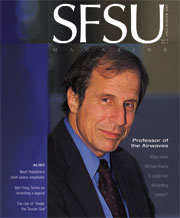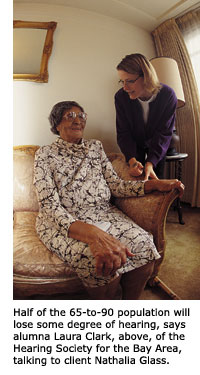 |
| |||
The Hearing Aid Laura Clark(M.A., '03) rings the doorbell and frowns. The "ding dong" is much too soft, she notes. Then she leans her head back to catch a glimpse of her client, 95-year-old Nathalia Glass, waving from the upstairs window and tossing keys down to Clark, who unlocks the front door, and heads upstairs. When you're 95 years old, hard of hearing and have lived alone up a flight of stairs in a San Francisco duplex for the past 20 years, you get creative about how to make things work. Clark's job is to help make things work just a little bit better. Since earning a master's degree in counseling from San Francisco State in May, Clark has worked for the Hearing Society for the Bay Area, a San Francisco-based nonprofit that provides services to the hearing impaired. Clark specializes in helping older people. A big part of her job involves home visits so she can suggest ways to help people get along with their impairment. "So many older adults are already so isolated," Clark says. "Hearing loss often keeps them even more isolated from the phone or from family." Glass has been living on her own since her husband died two decades ago. Her health is pretty good, she tells Clark, but recently she started having trouble hearing. "Can you communicate with your family?" Clark asks. She uses something called a "pocket talker" to help Glass hear her more clearly. It's a hand-held personal amplifier for people who don't have hearing aids, but might need them. Clark recommends they try to get one for Glass. Their discussion revolves around what Clark can do to help Glass communicate better with her children and grandchildren and to hear the TV. Clark makes plans to replace Glass's phones with those with amplified ringers and to get a door bell signal with a flashing light so she knows when someone's at her front door without having to wait by the upstairs window. The growing population of elderly, like Glass, convinced Clark to pursue a career working with the aging deaf. San Francisco State had just the program she needed, a specialization in rehabilitation counseling for the deaf, and hard of hearing. There are only about half a dozen similar counseling rehabilitation programs across the country, according to Professor Alice Nemon, who started the program at SF State. Other graduates have gone on to work at the state Department of Rehabilitation, with disabled students at community colleges, and in residential treatment programs for the deaf with mental illness. -- Anne Burke
| ||||









